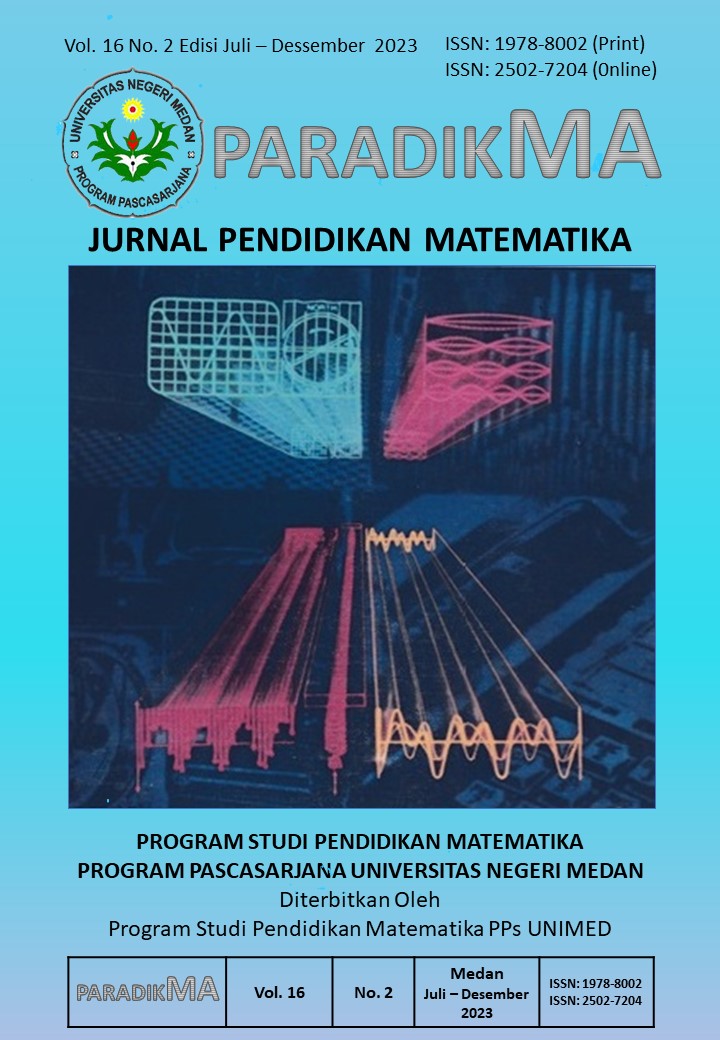Current Research On Problem Posing : A Review
DOI:
https://doi.org/10.24114/paradikma.v16i2.46425Abstract
Teachers and students must learn how to pose problems effectively, hence there is a need for ongoing research on this topic. In order to identify the next topic that can be explored in the field of problem posing, this study aims to capture the latest research trends regarding problem posing over the last five years, starting from 2018-2023. The method used is Systematic Literature Review (SLR). The results of this study are research on problem posing widely spread in various topics, including a) theoretical considerations of problem posing, b) the relationship between problem posing and other abilities, c) analysis of teacher problem posing abilities, d) analysis of students' problem posing abilities and e) learning design to improve problem posing skills. These findings indicate that the problem posing has been extensively researched by scholars. The development of teaching materials that involve problem posing and learning design to enhance prospective teacher problem posing skill are two potential area of future research.References
Abu-Elwan, R. (1999). The development of Mathematical Problem Posing Skills for Prospective Middle School Teachers. Proceedings of the International Conference on Mathematical Education into the 21st Century: Social Challenges, Issues and Approaches , 1“8.
Afrilianto, M., Sabandar, J., & Wahyudin. (2019). Improving Students™ Mathematical Problem Posing Ability Using PACE Model. Journal of Physics: Conference Series, 1315(1). https://doi.org/10.1088/1742-6596/1315/1/012007
Bataller, A., Ferrando, I., & Reyes-Torres, A. (2022). Visual Poetry and Real Context Situations in Mathematical Problem Posing and Solving: A Study of the Affective Impact. Mathematics, 10(10). https://doi.org/10.3390/math10101647
Bevan, D., & Capraro, M. M. (2021). Posing Creative Problems: A Study of Elementary Students™ Mathematics Understanding. International Electronic Journal of Mathematics Education, 16(3), em0654. https://doi.org/10.29333/iejme/11109
Busaka, C., Umugiraneza, O., & Kitta, S. R. (2022). Mathematics teachers™ conceptual understanding of soft skills in secondary schools in Zambia. Eurasia Journal of Mathematics, Science and Technology Education, 18(7). https://doi.org/10.29333/ejmste/12160
Cahyani, A., Putri, Z. R., & Fitriani, N. (2020). The influence of problem posing learning on mathematical solution ability of junior high school. Journal of Physics: Conference Series, 1657(1). https://doi.org/10.1088/1742-6596/1657/1/012088
Cai, J., Chen, T., Li, X., Xu, R., Zhang, S., Hu, Y., Zhang, L., & Song, N. (2020). Exploring the impact of a problem-posing workshop on elementary school mathematics teachers™ conceptions on problem posing and lesson design. International Journal of Educational Research, 102. https://doi.org/10.1016/j.ijer.2019.02.004
Cai, J., & Hwang, S. (2020). Learning to teach through mathematical problem posing: Theoretical considerations, methodology, and directions for future research. International Journal of Educational Research, 102. https://doi.org/10.1016/j.ijer.2019.01.001
Calabrese, J. E., Capraro, M. M., & Thompson, C. G. (2022). The Relationship Between Problem Posing and Problem Solving: A Systematic Review. International Education Studies, 15(4), 1. https://doi.org/10.5539/ies.v15n4p1
Candiasa, I. M., Santiyadnya, N., & Sunu, G. K. A. (2018). Using puzzle to encourage students to do problem posing. Journal of Physics: Conference Series, 1040(1). https://doi.org/10.1088/1742-6596/1040/1/012025
ChavarrÃa-Arroyo, G., & Albanese, V. (2023). Contextualized Mathematical Problems: Perspective of Teachers about Problem Posing. Education Sciences, 13(1). https://doi.org/10.3390/educsci13010006
Daher, W., & Anabousy, A. (2018). Creativity of pre-service teachers in problem posing. Eurasia Journal of Mathematics, Science and Technology Education, 14(7), 2929“2945. https://doi.org/10.29333/ejmste/90994
Deringöl, Y., & Guseinova, E. (2022). Problem-Posing Activities in Primary School Mathematics Textbooks in Russia and Azerbaijan. Mimbar Sekolah Dasar, 9(3), 535“551. https://doi.org/10.53400/mimbar-sd.v9i3.44863
Dewi, H. L., & Marsigit. (2018). Mathematical creative thinking and problem posing: An analysis of vocational high school students™ problem posing. Journal of Physics: Conference Series, 1097(1). https://doi.org/10.1088/1742-6596/1097/1/012134
Dwita, A. (2020). Improving Problem-Solving Ability Through Problem-Posing Model in Mathematics.
Espinoza, J., Lupiáñez, J. L., & Segovia, I. (2022). A Study of the Complexity of Problems Posed by Talented Students in Mathematics. Mathematics, 10(11). https://doi.org/10.3390/math10111841
Evendi, E., Al Kusaeri, A. K., Pardi, M. H. H., Sucipto, L., Bayani, F., & Prayogi, S. (2022). Assessing students™ critical thinking skills viewed from cognitive style: Study on implementation of problem-based e-learning model in mathematics courses. Eurasia Journal of Mathematics, Science and Technology Education, 18(7). https://doi.org/10.29333/ejmste/12161
Guo, Y., Yan, J., & Men, T. (2021). Chinese junior high school students™ mathematical problem-posing performance. ZDM - Mathematics Education, 53(4), 905“917. https://doi.org/10.1007/s11858-021-01240-7
Haenilah, E. Y., Yanzi, H., & Drupadi, R. (2021). The Effect of the Scientific Approach-Based Learning on Problem Solving Skills in Early Childhood: Preliminary Study. International Journal of Instruction, 14(2), 289“304. https://doi.org/10.29333/iji.2021.14217a
Hendriana, H., Sumarmo, U., Carli, C., Ristiana, M. G., & Putra, H. D. (2019). Enhancing students mathematical creative skill and resilience by using problem posing approach. Journal of Physics: Conference Series, 1318(1). https://doi.org/10.1088/1742-6596/1318/1/012065
Hošpesová, A., Novotná, J., Vondrová, N., Moraová, H., & Tichá, M. (2021). From teacher of nations to teacher of mathematics. Mathematics, 9(14). https://doi.org/10.3390/math9141583
Isnani, Waluya, S. B., & Rochmad. (2020). Problem posing in the proof process identifying creative thinking in mathematics. Journal of Physics: Conference Series, 1657(1). https://doi.org/10.1088/1742-6596/1657/1/012066
Isrokatun, I., Haryani, C. S., & Rahmi, N. I. (2021). Analysis of mathematical problem-posing ability. Journal of Physics: Conference Series, 1869(1). https://doi.org/10.1088/1742-6596/1869/1/012122
Kertiyani, N. M. I., Fatimah, S., & Dahlan, J. A. (2022). Critical thinking skill through problem-based learning with problem posing within-solution. Journal of Mathematics and Science Teacher, 2(2), em017. https://doi.org/10.29333/mathsciteacher/12369
Kovács, Z., Báró, E., Lócska, O., & Kónya, E. (2023). Incorporating Problem-Posing into Sixth-Grade Mathematics Classes. Education Sciences, 13(2). https://doi.org/10.3390/educsci13020151
Krismadinata, Verawardina, U., Jalinus, N., Rizal, F., Sukardi, Sudira, P., Ramadhani, D., Lubis, A. L., Friadi, J., Arifin, A. S. R., & Novaliendry, D. (2020). Blended learning as instructional model in vocational education: Literature review. Universal Journal of Educational Research, 8(11B), 5801“5815. https://doi.org/10.13189/ujer.2020.082214
Lee, J. E., Pak, B., & Lim, W. (2021). Building preservice teachers™ diagnostic competence: an exploratory study in the domain of fractions. Mathematics, 9(16). https://doi.org/10.3390/math9161870
Liljedahl, P., & Cai, J. (2021). Empirical research on problem solving and problem posing: a look at the state of the art. ZDM - Mathematics Education, 53(4), 723“735. https://doi.org/10.1007/s11858-021-01291-w
Martinez, S., & Blanco, V. (2021). Analysis of problem posing using different fractions meanings. Education Sciences, 11(2), 1“12. https://doi.org/10.3390/educsci11020065
McDonald, P. A., & Smith, J. M. (2020). Improving mathematical learning in Scotland™s Curriculum for Excellence through problem posing: an integrative review. Curriculum Journal, 31(3), 398“435. https://doi.org/10.1002/curj.15
Nofrianto, A., & Jumrawarsi, J. (2019). Teacher™s Problem and Scientific Learning Approach: An Investigation on Teacher™s Problem-Posing Ability. Journal of Physics: Conference Series, 1155(1). https://doi.org/10.1088/1742-6596/1155/1/012006
Nuraeni, Z., & Rosyid, A. (2019). Implementation of Index Card Match Learning Model with Problem Posing Approach Assisted by MATLAB Software to Improve Students™ Problem Solving Ability. Journal of Physics: Conference Series, 1179(1). https://doi.org/10.1088/1742-6596/1179/1/012074
Nuriyatin, S., & Widadah, S. (2020). Learning design of geometri lukis to support the prospective teachers™ problem posing ability. Journal of Physics: Conference Series, 1470(1). https://doi.org/10.1088/1742-6596/1470/1/012066
Papadopoulos, I., Patsiala, N., Baumanns, L., & Rott, B. (2022). Multiple Approaches to Problem Posing: Theoretical Considerations Regarding its Definition, Conceptualisation, and Implementation. Center for Educational Policy Studies Journal, 12(1), 13“34. https://doi.org/10.26529/cepsj.878
Peng, A., Li, M., Lin, L., Cao, L., & Cai, J. (2022). Problem Posing and Its Relationship with Teaching Experience of Elementary School Mathematics Teachers from Ethnic Minority Area in Southwest China. Eurasia Journal of Mathematics, Science and Technology Education, 18(2). https://doi.org/10.29333/EJMSTE/11534
Ramadianti, W., & Priatna, N. (2019). Experience of novice teachers to present mathematical problems. Journal of Physics: Conference Series, 1280(4). https://doi.org/10.1088/1742-6596/1280/4/042043
Rosaini, Budiyono, & Pratiwi, H. (2019). How does HOTS based problem posing model improve students™ attitudes toward mathematics? IOP Conference Series: Earth and Environmental Science, 243(1). https://doi.org/10.1088/1755-1315/243/1/012138
Silver, E. A., & Cai, J. (1996). An analysis of arithmetic problem posing by middle school students. Journal for Research in Mathematics Education, 27(5), 521“539. https://doi.org/10.2307/749846
Supandi, S., Ariyanto, L., Kusumaningsih, W., Handayanto, A., & Sarra, R. R. (2020). The improvement of students™ mathematics critical thinking abilities in topic prism and pyramid by using the Problem Posing approach. Journal of Physics: Conference Series, 1663(1). https://doi.org/10.1088/1742-6596/1663/1/012019
Suri, A., Kusnandi, & Juandi, D. (2021). A case study of analyzing 10thgrade students using what-if-not strategy for mathematical problem posing in trigonometry topic. Journal of Physics: Conference Series, 1806(1). https://doi.org/10.1088/1742-6596/1806/1/012094
Titikusumawati, E., Sa™dijah, C., As™ari, A. R., & Susanto, H. (2019). An Analysis of Students™ Creative Thinking Skill in Creating Open-Ended Mathematics Problems through Semi-Structured Problem Posing. Journal of Physics: Conference Series, 1227(1). https://doi.org/10.1088/1742-6596/1227/1/012024
Zulfikar, Anwar, & Yusrizal. (2020). The optimism of junior high school students in mathematical problem posing. Journal of Physics: Conference Series, 1460(1). https://doi.org/10.1088/1742-6596/1460/1/012037







